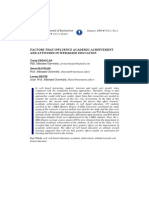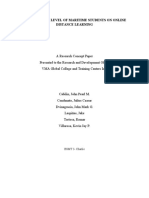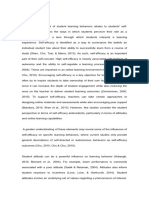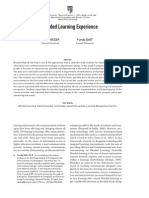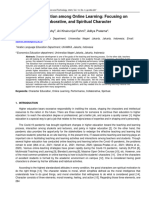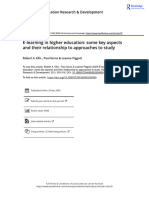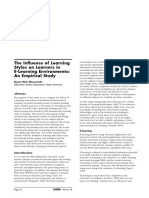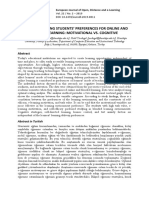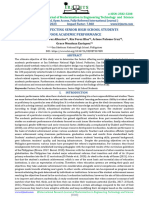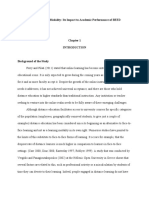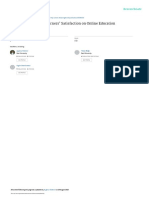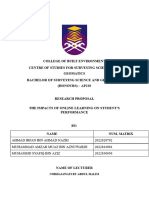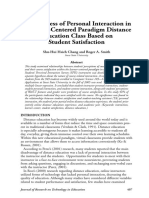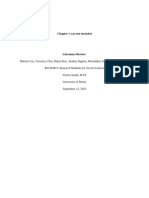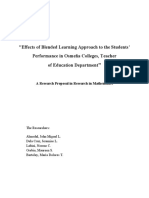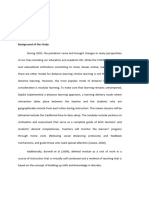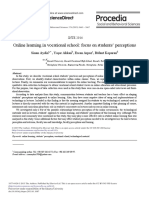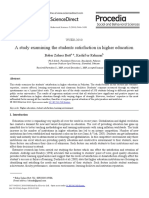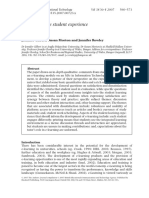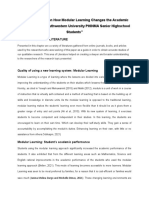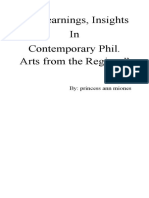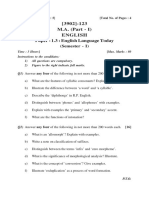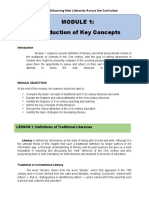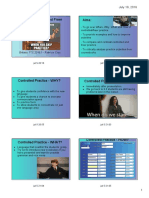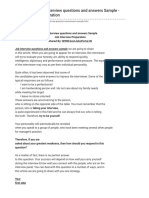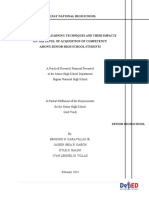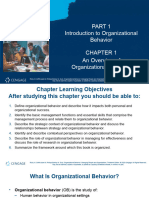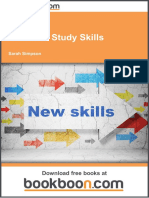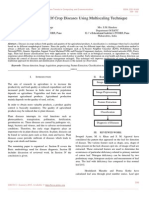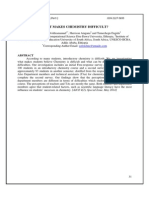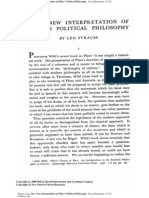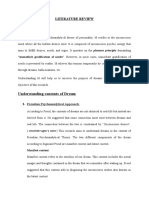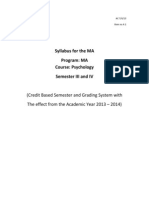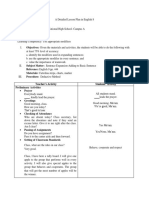The Role of Personality Traits in Web Based Education: Marmara University, Atatürk Education Faculty
The Role of Personality Traits in Web Based Education: Marmara University, Atatürk Education Faculty
Uploaded by
Vidosav IvanovićOriginal Description:
Original Title
Copyright
Available Formats
Share this document
Did you find this document useful?
Is this content inappropriate?
Report this DocumentCopyright:
Available Formats
The Role of Personality Traits in Web Based Education: Marmara University, Atatürk Education Faculty
The Role of Personality Traits in Web Based Education: Marmara University, Atatürk Education Faculty
Uploaded by
Vidosav IvanovićCopyright:
Available Formats
The Turkish Online Journal of Educational Technology TOJET April 2008 ISSN: 1303-6521 volume 7 Issue 2 Article 5
THE ROLE OF PERSONALITY TRAITS IN WEB BASED EDUCATION
Servet BAYRAM, Levent DENZ, Yavuz ERDOAN Marmara University, Atatrk Education Faculty sbayram@marmara.edu.tr, ldeniz@marmara.edu.tr, yavuzerdogan@gmail.com ABSTRACT This study aims to investigate the relationships among personality traits and learners academic achievement in a web based environment and attitudes towards web based education. 127 students enrolled in the e-MBA Masters Degree of Bilgi University constituted the study group of the research. A survey method was used for the study and the data were collected by Web Based Education Attitudes Scale and The Adjective Check List (ACL). At the end of the study, it was revealed that the students were successful in the web based education environment with the average of 3.091 out of 4.00. The average of students attitudes towards web based education was 97.212 out of 135. The arithmetical average of the items in the attitudes scale was 3.738 out of 5.00. Also, significant relationships were found between learners personality traits, academic achievement and attitudes towards web based education. The findings revealed that personality traits explain about 53.2% of the academic achievement, and 52.7% of the attitudes towards web based education. Keywords: Web based education, personality traits, academic achievement, and attitudes towards web based education. INTRODUCTION Web based learning have provided students different learning alternatives that have expanded the educational process beyond the traditional classroom. Web technologies penetration of our lives and of both formal and informal education has created a need to examine the various aspects of this new way of learning and to explore how it fits in with different learners' needs (Shany & Nachmias, 2002). Which students can be expected to benefit more from this new learning environment? To what extent is this environment accessible to students with particular styles of thinking, and compatible with their needs? Even though the internet has now been used for over a decade as an education medium for distance delivery, we continue to know relatively little about the characteristics of learners who choose to enroll and succeed in such learning environments. In web based environment, learner interest, expectation and needs differ quite a lot from the traditional educational approaches (Frith & Kee, 2003; Glenn, 2001). That is why adverse effects may result for the future of the system if solutions similar to traditional educational approaches are sought in response to learner issues in this new environment; because achieving the targeted success levels depends on understanding the learners. Literature suggests that individual differences such as cognitive processing styles, learning styles and personality traits are very important in the learning process . In this respect personality traits have been suggested to be one of the important factors that influence students success in web based education. Cattell and Kline (1977, p.5) stressed that personality is the natural core of psychological science, since the process area such as perception, memory, learning theory, physiological psychology can only be effectively understood in relation to the unified organism (Mai & Mai, 2002). Personality traits have a positive or negative relationship with motivation and academic achievement, depending on the type of learning activities. Research dating back to the 1960s demonstrates that an individuals personality traits are good predictors of future training and learning performance (Wiggins, Blackburn & Hackman, 1969). Inspired by this research, we believe that personality traits that contribute to student learning should be assessed in order to determine who is most certain to benefit from totally web based courses (Eyong & Schniederjans, 2004). Marks (2000) reported that differences between students rather than differences between classes or schools were responsible for the majority of variability in academic engagement, thus emphasizing the role of students' personality over environmental factors. Therefore, it is important for educators to be informed about the relationship between personality traits and learning performance, but particularly important for web based distance educators. As Atkinson (2001) argues, in a face-to-face teaching situation the instructor can observe the course participants learning and adjust the pace, content, and activities according to their progress. The ability to make adjustments arises out of the instructors ability to read the situation. However, it is more complex in a web based learning environment (Kanuka & Nocente, 2003). Personality traits may help explain some of the variability among students registering to web based courses. For instance, it may be that web based courses appeal more to the introverted student who walks away from the face-to-face experience and has a more positive attitude to and greater success in web based learning environments (Clark, Uhler & Fisher, 2007). Conscientiousness that is characterized as being purposeful, strong-willed and responsible has the strongest and most stable relationship with academic performance (Busato et al., 2000). Openness to experience, defined as 41
The Turkish Online Journal of Educational Technology TOJET April 2008 ISSN: 1303-6521 volume 7 Issue 2 Article 5
being open-minded, having an active imagination and preferring variety, was also associated with academic achievement (Blickle, 1996; Lounsbury et al., 2003). Research has shown that introverted (versus extroverted) individuals are more predisposed to web based learning (Moore & Kearsley, 1996). Accordingly, Biner et al. (1995) found that students in web based education programs tended to be more self-sufficient and/or introverted, lax, and expedient than traditional on-campus learners. Being emotionally stable, intelligent, trusting, compulsive, passive, and conforming were also found to be associated with success in web based learning environments (Chamorro-Premuzic & Furnham, 2003; Kanuka & Nocente, 2003; Eyong & Schniederjans, 2004). As such, it is impossible to draw any kind of meaningful conclusion from a comparison of the results of previous research on learning performance. On the other hand, learners attitudes towards web based education significantly affect learning outcomes (Sanders & Morrison-Shetlar, 2001; Alomyan & Au, 2004). Learner attitudes are one of the important factors used to measure success of a course, program or curriculum (Phipps & Merisotis, 1999). Therefore, it is necessary for institutions that offer web based education to consider learner expectation and attitudes (Daniels, Tyler, & Christie, 2000). It is also essential to identify affective characteristics such as learner expectation and attitudes in order to obtain positive outcomes from web based learning in education (Erdogan, 2007). For these reasons, a better understanding of the relationship between personality traits and attitudes towards web based education would prove to be beneficial. In the light of the foregoing issues, the purpose of this study was to investigate whether personality traits were related to learners attitudes towards web based education and academic achievement in a web based environment. The research questions were thus the following: Research Questions In this study; the research questions can be stated as follows; 1. What are the personality traits of Turkish students? 2. Are there any significant relationships between learners personality traits and academic achievement in web based education? 3. Are there any significant relationships between learners personality traits and attitudes towards web based education? 4. Are there any personality traits that significantly predict the learners academic achievement in web based education? If so, what are they? 5. Are there any personality traits that significantly predict the learners attitudes towards web based education? If so, what are they? METHODOLOGY Research Model In the current study, a correlational design was used to investigate the relationships among personality traits, GPA and attitudes towards web based education. Participants were briefed on the purpose of the study and they participated on the principle of willingness. The participants then signed the consent form and completed the survey by themselves. The procedures of the study were explained to the students and any questions arose were answered. Participants Learners, enrolled in the e-MBA Masters Degree of Bilgi University in 2005, constituted the study group of the research. 127 learners (out of 570) were chosen randomly to take part in the study. The e-MBA Program Bilgi University e-MBA Masters Degree is a web based masters degree in business approved by the Turkish Council of Higher Education and is a web based distance learning system. A total of 786 students are enrolled in the Bilgi University e-MBA Degree, who live in 50 different cities and hold bachelor degrees from 63 different universities (Bilgi Online, 2007). The degree was designed to equip learners with information on subjects such as finance, human resources, marketing and entrepreneurship and to supply strategic demands of the business world. The e-MBA degree offers a Turkish and an English alternative and consists of three sections. Eight required and two optional courses as well as a graduation project should be achieved in order to graduate. The passing grade is 63 out of 100. The final examination, which takes place under supervision accounts for 50% of the passing grade. A minimum of 70% success rate is required in the final examination. The length of study in the program is one and a half years and is composed of three half terms. This period can be extended to at most six half terms if one needs to sign up again for the failed courses or in case of a delay in finalizing the graduation project. Course materials prepared by the academic staff are published weekly on the web page of the course on the e-MBA degree website and remain accessible until the end of term. Thus, while the students 42
The Turkish Online Journal of Educational Technology TOJET April 2008 ISSN: 1303-6521 volume 7 Issue 2 Article 5
study the recently added course notes each week, it is also possible to revise previous notes until the end of the term. Students can also study the course books listed in the program. Quizzes presented at the end of the covered material each week and the interactive questions on the course website allow learners to improve and question their own learning (Bilgi Online, 2007). Instruments Data collection took place on the weeks the e-MBA Degree students came to the campus for purposes of final examination or retaking the failed courses. Initially, a Web Based Education Attitudes Scale and The Adjective Check List (ACL) were administered to the e-MBA degree students. Then, the e-MBA Degree average course grades (GPA) were obtained from the department to determine academic achievement of the students. Details pertaining to the data collection instruments are presented below. Web Based Education Attitudes Scale (WBE-AS) A 5-point likert scale consisting of 58 questions was developed based on expert opinions and literature review in order to reveal students attitudes towards web based education (Erdoan et al., 2007). The 5-point scale was as follows: (5) totally agree, (4) agree, (3) undecided, (2) disagree and (1) totally disagree. 28 items on the scale were cognitive, 18 were affective and 12 were behavioral statements. 35 items were positively and 23 were negatively worded in order to offset the respondents tendency to approve the statements (Tavsancl & Keser, 2002). The statements were listed randomly. Content validity was ensured at the initial phase of validity and reliability studies of the scale. Item representativeness was evaluated by expert reviews from the areas of Computer and Instructional Technologies, Testing and Evaluation, Psychological Counseling and Guidance and Turkish Language and Literature. 90-100% expert agreement on the validity of each item was adopted as the criteria; items that did not comply with the criteria were removed from the WBE-AS. Construct validity of the scale was ensured by factor analysis and item analysis. As part of the item analysis, item total, item residual and index of discrimination were calculated respectively. At the end of the validity studies, 32 items were eliminated from the scale leaving a 26-item WBE attitudes scale to be administered. Cronbach Alpha internal consistency coefficient of the WBE attitudes scale was .917. Ozdamar (1999) states that a scale is highly reliable if the Cronbach Alpha internal consistency coefficient is between .80 and 1.00 (.80 <1.00). Accordingly, WBE attitudes scale can be accepted as a reliable measurement tool. The Adjective Check List (ACL) Inventory The ACL (Gough & Heilbrun, 1983) is a versatile tool for assessing personality and perceived psychological tendencies of adults and adolescents. The ACL consists of 300 adjectives comprising 37 scales that include measures of psychological needs based on Murrays needs (1983), ego functioning based on Bernes theory (1961), creativity and intelligence based on Welshs intellection concept (1975), and topical scales created by the authors. The validity and reliability studies were carried out by Savran (1993) who adapted ACL to Turkish. Alpha coefficients of the scale range from .46 to .84 which falls within the range of acceptable reliability coefficients for personality measures (2002). In the current study 15 need scales and 9 topical scales were used to assess Turkish students personality traits. Data Analysis In order to specify the correlations between students personality traits, GPA and attitudes towards web based education pearson moments correlation coefficient was used. In addition, with the aim of obtaining the most suitable regression equivalent in explaining the students GPA and attitudes towards web based education multiple regression analysis was used. GPA and attitudes towards web based education are specified as dependent variables whereas personality traits are specified as the independent variables. RESULTS For the data analysis, first, the descriptive statistics of 127 students are presented in Table 1. Table 1. Descriptive statistics for GPA and WBE attitudes Dependent variables Mean St. Dev. GPA WBE Attitudes Scale 3.091 97.212 0.713 13.586
As illustrated in Table 1, the average academic achievement of web based education students was 3.091 out of 4.00 with a standard deviation of 0.713. This result indicated that the students were successful in the web based education context. The average of students attitudes towards web based education was 97.212 out of 135 with a standard deviation of 13.586. The arithmetical average of the items in the attitudes scale was 3.738 out of 5.00. 43
The Turkish Online Journal of Educational Technology TOJET April 2008 ISSN: 1303-6521 volume 7 Issue 2 Article 5
The average point between 3.00 and 4.00 is considered within the category of I agree; therefore, it is possible to conclude that students expressed positive opinions in favor of web based education.
Figure 1. The means of personality traits of the students For the interpretation of the Adjective Checklist (ACL), first of all the scales above and below 50 points are determined. From the scales above 50, five highest sub-scales are then specified and their basic traits are identified from the highest to the lowest. Then the Q-Sort definitions are used which display a positive correlation with the scale. After determining the first five sub-scales, the lowest three scales are specified and for their interpretation Q-Sort definitions which display a negative correlation with the scale (Savran, 1993). The means of personality traits are presented in Figure 1. Considering the results, the top 5 sub-scales above 50 are respectively; ideal self (53.87), dominance (53.18), order (53.16), achievement (53.09) and aggression (51.96). The personality traits which have the lowest points are found to be feminine attributes (45.52), succorance (46.56) and heterosexuality (47.81). The common points of the personality traits; ideal self, dominance, achievement, aggression and order can be summarized as follows; are productive and talkative, are decisive in their behaviors and are impulsive, attaches importance to power, has high ideals, and achieving those ideals are very important for them. The relations among the students personality traits, academic achievement and attitudes towards web based education are specified in Table 2. Table 2. The relationships among personality traits, academic achievement and attitudes towards web based education GPA Attitude Personality traits r p R p Achievement 0.277 0.004 0.232 0.016 Dominance 0.090 0.359 0.166 0.087 Endurance 0.212 0.212 0.187 0.053 Order 0.093 0.342 0.100 0.304 Interception -0.036 0.713 0.095 0.332 Nurturance -0.094 0.336 0.193 0.046 Affiliation -0.069 0.479 0.098 0.314 44
The Turkish Online Journal of Educational Technology TOJET April 2008 ISSN: 1303-6521 volume 7 Issue 2 Article 5
Heterosexuality Exhibition Autonomy Aggression Change Succorance Abasement Deference Counseling readiness Self-control Self confidence Personal adjustment Ideal self Creative personality Military leadership Masculine attributes Feminine attributes
0.018 0.092 -0.004 0.033 -0.194 -0.063 -0.099 -0.156 0.223 -0.067 0.087 -0.006 0.255 0.057 0.040 -0.043 -0.136
0.855 0.347 0.970 0.733 0.045 0.517 0.311 0.109 0.021 0.496 0.375 0.951 0.008 0.559 0.683 0.663 0.164
-0.019 -0.039 -0.149 0.018 0.016 -0.210 -0.109 -0.023 0.012 -0.034 0.153 0.065 0.243 -0.026 0.241 0.063 -0.097
0.844 0.686 0.124 0.850 0.871 0.029 0.264 0.811 0.901 0.725 0.114 0.506 0.011 0.788 0.012 0.520 0.321
Table 2 reveals the positive correlations were found among the students personality traits and GPA such as achievement (r=0.277, p<0.05), counseling readiness (r=0.223, p<0.05) and ideal self (r=0.255, p<0.05). However, negative correlation was also detected between change and GPA (r= -.194, p<0.01). On the other hand, significant positive correlations were found between personality traits and attitudes towards web based education such as achievement (r=0.232, p<0.05), nurturance (r=0.193, p<0.05), ideal self (r=0.243, p<0.05) and military leadership (r=0.241, p<0.05). However, attitudes towards web based education was negatively correlated with personality traits such as succorance (r=-0.210, p<0.01). Table 3 shows the results of the multiple regression analysis regarding the prediction of the students GPA scores in web based education. Table 3. The results of the multiple regression analysis regarding the prediction of the students GPA scores in web based education B St. Er. eta t p Constant -0.283 2.225 -0.127 0.899 Achievement 0.005 0.009 0.068 0.480 0.632 Dominance -0.008 0.013 -0.120 -0.645 0.521 Endurance 0.020 0.011 0.308 1.861 0.067 Order -0.018 0.011 -0.272 -1.610 0.111 Interception 0.011 0.008 0.157 1.337 0.185 Nurturance -0.029 0.012 -0.420 -2.481 0.015 Affiliation -0.012 0.010 -0.178 -1.267 0.209 Heterosexuality 0.009 0.008 0.140 1.122 0.265 Exhibition 0.045 0.014 0.535 3.165 0.002 Autonomy 0.005 0.012 0.058 0.420 0.675 Aggression -0.019 0.013 -0.237 -1.491 0.140 Change -0.020 0.008 -0.294 -2.509 0.014 Succorance -0.014 0.009 -0.196 -1.583 0.118 Abasement 0.009 0.013 0.120 0.667 0.506 Deference 0.008 0.014 0.101 0.612 0.542 Counseling readiness 0.015 0.005 0.323 3.255 0.002 Self-control 0.005 0.012 0.048 0.399 0.691 Self confidence 0.008 0.014 0.111 0.562 0.576 Personal adjustment 0.007 0.009 0.100 0.786 0.435 Ideal self 0.016 0.006 0.256 2.477 0.015 Creative personality 0.000 0.009 -0.005 -0.045 0.964 Military leadership -0.004 0.010 -0.054 -0.422 0.674 Masculine attributes -0.017 0.008 -0.258 -2.094 0.040 Feminine attributes 0.007 0.007 0.119 1.014 0.314 In order to identify the predictors of students GPA scores multiple regression analysis was used. As a result, positive relations were detected between the students GPA scores and personality traits (F=3.161; p<0.01). There are 24 different personality traits, and these traits explain about 53.2% of the total variance of the GPA scores. The variables that significantly predict the students GPA scores are counseling readiness (t=3.255; 45
The Turkish Online Journal of Educational Technology TOJET April 2008 ISSN: 1303-6521 volume 7 Issue 2 Article 5
p<.05), exhibition (t=3.165; p<.05), ideal self (t=2.477; p<.05), nurturance (t=-2.481; p<.05), change (t=-2.509; p<.05), and masculine attributes (t=-2.094; p<.05). Table 4 shows the results of the multiple regression analysis regarding the prediction of the students attitudes towards web based education. Table 4. The results of multiple the regression analysis regarding the prediction of the students attitudes towards web based education B St.Er. eta t p Constant 103,665 40,468 2.562 0.012 Achievement 0.132 0.179 0.104 0.738 0.463 Dominance 0.116 0.246 0.088 0.473 0.638 Endurance -0.257 0.205 -0.205 -1.253 0.214 Order -0.032 0.207 -0.026 -0.156 0.876 Interception -0.140 0.152 -0.107 -0.922 0.359 Nurturance 0.364 0.216 0.280 1.684 0.096 Affiliation -0.058 0.183 -0.044 -0.316 0.753 Heterosexuality -0.222 0.150 -0.181 -1.480 0.143 Exhibition -0.173 0.266 -0.110 -0.651 0.517 Autonomy -0.187 0.222 -0.115 -0.840 0.403 Aggression -0.212 0.240 -0.140 -0.885 0.379 Change -0.044 0.151 -0.034 -0.290 0.772 Succorance -0.131 0.172 -0.094 -0.764 0.447 Abasement 0.082 0.253 0.058 0.324 0.747 Deference -0.288 0.257 -0.184 -1.124 0.264 Counseling readiness -0.036 0.088 -0.040 -0.409 0.684 Self-control -0.226 0.231 -0.116 -0.978 0.331 Self confidence 0.335 0.269 0.244 1.245 0.217 Personal adjustment 0.009 0.166 0.007 0.054 0.957 Ideal self 0.060 0.120 0.051 0.498 0.620 Creative personality -0.296 0.162 -0.210 -1.822 0.072 Military leadership 0.156 0.187 0.107 0.835 0.406 Masculine attributes -0.021 0.158 -0.017 -0.134 0.894 Feminine attributes -0.163 0.134 -0.141 -1.213 0.229 Regression analysis results presented below in Table 4. The score of the attitudes towards web based education was run as the dependent variable in the regression analysis where personality traits were independent variables. This analysis yielded a significant result (F=3.263; p<0.01). Independent variables explain about 52.7% of the total variance of web based education attitudes. However, there is any personality traits that significantly predict the students attitudes towards web based education. DISCUSSIONS GPA scores and attitudes towards WBE The average academic achievement of web based education students was 3.091 out of 4.00 with a standard deviation of 0.713. This result indicated that the students were successful in the web based education context. In web based education, achievement levels similar to traditional education can be attained if sufficient support is provided. The results of several national and international studies denote the same idea. Leonard and Smita (2001) reported that students in web based education had an achievement level of 4.14 out of 5.00, while Johnson stated a level of 3.00 out of 4.00 (Johnson, 2001). Obtaining achievement levels, in web based education, akin to traditional educational settings results in an increase in the demand for web based education. In developed countries such as the USA and EU countries investment into web based education gradually increases each year. The average of students attitudes towards web based education was 97.212 out of 135 with a standard deviation of 13.586. The arithmetical average of the items in the attitudes scale was 3.738 out of 5.00. The average point between 3.00 and 4.00 is considered within the category of I agree; therefore, it is possible to conclude that students expressed positive opinions in favor of web based education. This is even more prominent when student answers to some of the web based education attitudes scale items are reviewed. For example the arithmetical average points for the following scale items were: WBE is an alternative solution to educational issues: 4.23/5.00; The prevalence of WBE would benefit the society: 4.14/5.00; WBE is as efficient as traditional education: 3.69/5.00. It will not be feasible to test the success of web based education only by means of students cognitive achievement. Affective learning is as equally important as cognitive learning in the context 46
The Turkish Online Journal of Educational Technology TOJET April 2008 ISSN: 1303-6521 volume 7 Issue 2 Article 5
of education, because a student, who has attained sufficient academic success, cannot be considered to have achieved educational goals completely if s/he is not satisfied with the training. The findings of the current study indicate that the students were satisfied with the training they received and trust such an educational setting. A review of relevant literature reveals several similar research findings. Kanuka and Nocente (2003) asserted that 97% of the students that took part in their study were satisfied with the web based training they received. Leonard and Smita (2001) investigated student perspectives in online education. They contended that 90% of the students who were in web based education expressed that they received the training they required in the online environment and 75% that the education met their expectations and would like to register for another online training. In a study by Chin and Chang (2002), 97% of the participants who received online education, from 14 different countries, stated their belief that web based education was beneficial. In a study on the importance of individual differences in web based education by Mira (2004), the participants generally voiced positive opinions of web based education. These results provide support for the findings of the current study. Correlations between GPA scores and personality traits In this study, positive correlations were found among the learners GPA scores and personality traits such as achievement, counseling readiness and ideal self. Personality traits predict the students GPA scores and explain about 52.3% of the total variance. The total variance shows that personality traits have a sufficient ratio of effect on GPA scores. The Q-Sort definitions that display a positive correlation with the achievement personality trait are as follows: Is selective in work and personal life? Is talkative and productive? Is quick to handle own business? His/her behaviors are decisive and impulsive. Has high ideals and attaining those ideals are very important for the individual? Is willing to attend to a certain work and to direct his/her attention to it? Is realistic, dreams and unrealistic thoughts do not have a place in his/her life? Is proud of being objective and rational? The Q-sort definitions in positive correlation with the counseling readiness sub-scale are: Is critical and skeptic? Is not easily influenced values intellectual and conceptual matters? Values own independence and autonomy. Is friendly? Can establish close relations, is compassionate? Is giving to others, is easily influenced? Does not object to others pressure and dominance on him/herself? The Q-sort definitions in positive correlation with the ideal self sub-scale are: Has a wide range of interests? Is productive? Is quick to handle issues? Has high ideals and attaining those ideals are very important for the individual? Has a certain and active role in society, is at ease among others? As the individual has high selfconfidence, has a tendency to advice others in similar ways? It is difficult to change the ideas of this person who has a unique life philosophy. The definitions above make it clear those individuals who have achievement; counseling readiness and ideal self personality traits are selective in their work and personal lives and work carefully. Their behaviors are decisive and impulsive. They have high ideals. Achieving their targets is very important for these individuals. In such a context, it is not surprising that those individuals, with the above mentioned personality traits whose grade points are high, also attain academic success in web based education environments. As this finding indicates, personality traits that have an impact on success in classical education systems also remain valid for web based environments. The results of several studies conducted at classical education settings have confirmed positive correlations between students personality traits of achievement and ideal self and their academic success (Ergn, 2003; Begik, 1997). Likewise, Begik (1997) found negative correlations between students personality trait of change and their academic success. The findings of the present study are in accordance with these previous findings. Therefore, it can be argued that students who are successful within the classical education system are also successful in web based education. On the other hand, several other studies have also investigated the relationship between students academic success and their personality traits (Valentia et al., 2001; Biner, et al. 1995, Wang and Newline, 2000). In their study where Eyong and Schniederjans (2004) investigated such a relationship identified statistically significant relations between academic success and five types of personality traits (contentedness, extroversion, attentiveness, stability and openness). Similarly, Shany and Nachmias (2001) observed that personality traits had an effect on success and attitude. For example; students with a liberal style were found to be more successful and contended in online environments than other students and introverted students to be more successful than extroverts. In contrast, the research by Shih and Gamon (1999) indicated that there was not any meaningful correlation between students personality traits and their success.
47
The Turkish Online Journal of Educational Technology TOJET April 2008 ISSN: 1303-6521 volume 7 Issue 2 Article 5
Correlations between WBE attitudes and personality traits The results displayed a positive correlation between web based education attitudes of the students in the study group and their personality traits of achievement, tenderness, ideal self and military leadership; and a negative correlation with the personality trait of succorance. 52.7% of the variance in attitudes towards web based education is explained by students personality traits. It is an anticipated result in that the students who score high on the sub-scales of achievement, nurturance and ideal self would also have a positive attitude towards web based education with respect to productivity and communication. Internet offers a great opportunity to access information, to communicate and to keep up-to-date with innovations. That is why these students consider web based environment as an effective tool in achieving their ideals which are of high importance to them. Many of us have certain dominant tendencies in the way we process information and in comprehension procedures. These choices, in integration with personality traits, create the learning motive. For instance, introverted students tend to hesitate before they take action, extroverts act without any hesitations at all. In a web based environment, the introverted student has a chance to think before responding to discussion threads and thus is able to react more at ease. In contrast, introverted students usually prefer to keep silent and passive in face-to-face education as they cannot express their immediate thoughts (Ellis, 2003). On the other hand, the extroverted students, who are much more active and dominant in classical education, tend to give up on the course as they grow impatient in front of the computer. Therefore, participation levels decrease in such education programs (Livingood, 1995). Many studies to date have revealed meaningful relations between students personality traits and their attitudes towards web based education (Shany and Nachmias, 2001). For example, the research by Russel investigated the relationship between students personality traits and their web based education attitudes in which personality types of the participants were determined using Myers Briggs Type Indicator (MBTI) (Russell, 2002). The findings of the study laid out differences in expectations from and attitudes towards web based education among students who had different personality types. In a similar vein, Ellis also explored relations between students personality types and their attitudes towards web based education and specified positive relations between personality types and attitudes (Ellis, 2003). On the contrary, such a relationship was not observed in other studies (Kanuka and Nocente, 2003; Stokes, 2001). FUTURE DIRECTIONS As exemplified by the above findings, a thorough analysis of personalities, abilities, interests and attitudes of students in web based education is crucial for web based education systems to be effective and permanent (Anderson, 2003; Stokes, 2001). It may not be favorable to suggest such educational settings to students without knowing the ways to success, because web based education is not suitable for all student types (Muse, 2003). Therefore, assessment tools are needed that could be used to determine the students who have a risk of being unsuccessful in web based education. Individual characteristics that could affect learning outcomes should certainly be considered in choosing students to web based education (Eyong and Schniederjans, 2003). Educational managers, pedagogues, psychological-counseling consultants, communication experts and instructional technologists should work in cooperation in order to attain success in web based education. As is clear from the research findings, students personality traits are prominent in predicting the success in web based education. Therefore, it is argued that the use of relevant tests in student selection decisions by institutions that offer web based graduate courses would promote quality in education. Personality traits that effect students achievement and attitudes were discussed by the current study. Prospective studies could investigate other individual characteristics such as intelligence, ability, learning styles or cultural variables. The present study was limited to the sub-scales of the Adjective List. Future research could complement the results by employing the other sub-scales of ACL: Ego states and control. The present study was also limited to the students in web based education. Future research could probe the perspectives and approaches of the lecturers, managerial or technical staffs who work in web based education settings. REFERENCES Alomyan, H. & Au, W. (2004). Exploration of instructional strategies and individual difference within the context of web-based learning, International Education Journal, 4 (4), 86-92. Atkinson, S. (2001). Cognitive styles and computer-aided learning (CAL): Exploring designer and user perspectives. Paper presented at the PATT-11 conference: New Media in Education, Eidenhoven, Netherlands. Begik, S. (1997). Akademik baarnn kestirilmesinde yetenek, ilgi, kiilik , lise baars ve SYS baarsnn etkisi. Marmara University, Social Science Institute (Unpublished Thesis), Istanbul. Berne, S. L. (1961). Transactional Analysis in Psychotherapy, New York, Grove Pres. 48
The Turkish Online Journal of Educational Technology TOJET April 2008 ISSN: 1303-6521 volume 7 Issue 2 Article 5
Bilgi Online. (2007) Master of e-MBA program in Bilgi University. [accessed: 19 January 2008]. URL; www.bilgiemba.net/tr. Biner, P., Bink, M., Huffman, M., & Dean, R. (1995). Personality characteristics differentiating and predicting the achievement of televised-course students and traditional-course students. The American Journal of Distance Education, 9(2), 4660. Blickle, G. (1996). Personality traits, learning strategies, and performance. European Journal of Personality, 10, 337352. Busato, V. V., Prins, F. J., Elshout, J. J., & Hamaker, C. (2000). Intellectual ability, learning style, achievement motivation and academic success of psychology students in higher education. Personality and Individual Differences, 29, 10571068. Chamorro-Premuzic, T., Moutafi, J., & Furnham, A. (2005). The relationship between personality traits, subjectivelyassessed, and fluid intelligence. Personality and Individual Differences, 38, 15171528. Cattell, R.B. & Kline, P. (1977). The Scientific Analysis of Personality and Motivation. London: Academic Press. Chin, K. L. & Chang, V. (2002). The use of web-based learning in culturally diverse learning environments. The Sixth Australian World Wide Web Conference, Rihga Colonial Club Resort, Australia. Daniels, M., Tyler, J. & Christie, B. (2000) On-Line Instruction in Counselor Education: Possibilities, Implications, and Guidelines. Virginia: American Counseling Association. Ellis, A.E. (2003). Personality Type and Participation in Networked Learning Environments. Educational Media International, 40 (2), 101-114. Erdoan, Y. (2005) Web tabanl yksekretimin rencilerin akademik basarlar ve tutumlar dorultusunda deerlendirilmesi. Marmara University, Social Science Institute (Unpublished Thesis), Istanbul. Erdoan, Y., Bayram, S. & Deniz, L. (2007). Web tabanl retim tutum lei: Aklayc ve dorulayc faktr analizi almas. Uluslararas nsan Bilimleri Dergisi, 4 (2), 1-14. Ergn, H. (2003). Deniz lisesi ve Deniz Harp Okulu rencilerinin genel-farkl yetenekleri, kiilik zellikleri ile fizik dersi ve genel okul baars arasndaki ilikiler. Marmara University, Social Science Institute (Unpublished Thesis), Istanbul. Eyong, B.K. & Schniederjans, M.J. (2004). The role of personality in web-based distance education courses. Communications of the ACM, 47 (3), 95-98. Frith, K.H. & Kee, C.C. (2003) The effect of communication on nursing student outcomes in a web-based course. Journal of Nursing Education, 42 (8), 350-358. Gabriel, S. (2002). Test Review: The Adjective Check List, Association for Assessment in Counseling, [accessed: 15 August 2006]. URL; http://aac.ncat.edu/newsnotes/y02fall.html Glenn, A. (2001). A Comparison of distance learning and traditional learning environments. Faculty of the Graduate School of Texas A&M University (Unpublished Dissertation), Texas. Gough, H. G., & Heilbrun, A .B. (1983). The Adjective Check List Manual (1983 ed.), Palo Alto, CA: Consulting Psychologists Press. Muse, H.E. (2003). The web-based community college student: an examination of factors that lead to success and risk. Internet and Higher Education, 6 (3), 241-261. Johnson, S. M. (2001) Teaching introductory international relations in an entirely web-based environment: comparing student performance across and within groups. Education at a Distance Journal, 15 (10), 514. Kanuka, H. & Nocente, N. (2003). Exploring the effects of personality type on perceived satisfaction with webbased learning in continuing professional development. Distance Education, 24 (7), 227-245. Leonard, J. & Smita, G. (2001). Education at the crossroads: on-line teaching and students' perspectives on distance learning. Journal of Research on Technology in Education, 34 (1), 51-57. Livingood, J. (1995). Revenge of the Introverts.Computer-Mediated Communication Magazine, 2 (4), 8-9. Lounsbury, J. W., Sundstrum, E., Loveland, J. M., & Gibson, L. W. (2003). Intelligence, Big Five personality traits, and work drive as predictors of course grade. Personality and Individual Differences, 35, 12311239. Mai, L. & Mai, L.C. (2002). The personality attributes and leisure activities of taiwanese internet users. The International Journal of Applied Marketing, 1 (1), 69-82. Marks, H. M. (2000). Student engagement in instructional activity: Patterns in the elementary, middle and high school, American Educational Research Journal, 37, 153184. Moore, M. G., & Kearsley, G. (1996). Distance Education: A Systems View. New York: Wadsworth. Muse, H. E. The web-based community college student: an examination of factors that lead to success and risk. The Internet and Higher Education, 6 (3), 241-261. Murray, H. (1983). Explorations in Personality, New York, Oxford University Press. Anderson, N. (2000). Web-based: instructional effectiveness, World Conference on Educational Multimedia, Hypermedia and Telecommunications, 2000 (1), 1583-1585. 49
The Turkish Online Journal of Educational Technology TOJET April 2008 ISSN: 1303-6521 volume 7 Issue 2 Article 5
zdamar, K. (1999). Paket Programlar ile statistiksel Veri Analizi, Eskisehir: Kaan Kitabevi. Russel, T. (1999). The no significant difference phenomenon. [accessed: 19 January 2008]. URL; http://teleeducation.nb.ca/significantdifference/. Sanders, D. W. & Morrison-Shetlar, A. I. (2001) Student attitudes toward web-enhanced instruction in an introductory biology course. Journal of Research on Computing in Education, 33 (3), 251-62. Savran, C. (2003). Sfat Listesinin Trkiye Koullarna Uygun Dilsel Edeerlilik, Geerlilik, Gvenirlilik ve Norm almas ve rnek Bir Uygulama, Marmara University, Social Science Institute (Unpublished dissertation), Istanbul. Shany, N. & Nachmias, R. (2001) The relationship between performance in a virtual course and thinking styles, gender, and ICT experience, World Conference on Educational Multimedia, Hypermedia and Telecommunications, 2001 (1), 1698-1702. Shih, C. & Gamon, J.A. (1999). Student motivation, learning style, learning strategies and achievement in webbased courses. Proceedings of the 1st Annual Congress on the Impact of Technology Upon Learning, Winston-Salem, NC. Stokes, S. P. (2001). Satisfaction of college students with the digital learning environment: Do learners temperaments make a difference? Internet and Higher Education, 4 (1), 31-44. Tavancl, E. & Keser, H. (2002). Internet kullanmna ynelik likert tutum lceinin gelitirilmesi. Egitim Bilimleri ve Uygulama Dergisi, 1 (1), 79-100. Valentia, A., Therriault, D., Dieter, M. & Mrtek, R. (2001). Identifying student attitudes and learning styles in distance education. Journal of Asynchronous Learning, 5 (1), 111-127. Wang, A. Y. & Michael, H. N. (2000). Characteristics of Students who enroll and succeed in psychology webbased classes. Journal of Educational Psychology, 92 (1), 137-143. Welsh, G. S. (1975).Creativity and intelligence: A Personality Approach. Chapel Hill, University of North Carolina, Institute for Research in Social Science. Wiggins, N., Blackburn, M., & Hackman, J. (1969). The prediction of first-year graduate success in psychology. Journal of Educational Research, 63.
50
You might also like
- EEL Continuum PrePrimaryDocument1 pageEEL Continuum PrePrimarysuji1974No ratings yet
- A Glossary of Key WordsDocument2 pagesA Glossary of Key WordsZaeed HuqNo ratings yet
- Ji Faktor2Document18 pagesJi Faktor2Fifi Nurul SafitriNo ratings yet
- Abstract Intoduction LearningDocument13 pagesAbstract Intoduction LearningDayang Syazwani Ag MuminNo ratings yet
- Preparedness Level of Maritime Students On Online Distance LearningDocument9 pagesPreparedness Level of Maritime Students On Online Distance LearningJohnmarkNo ratings yet
- Online Students' LMS Activities and Their Effect On Engagement, Information Literacy and Academic PerformanceDocument15 pagesOnline Students' LMS Activities and Their Effect On Engagement, Information Literacy and Academic PerformanceMariel BuhiaNo ratings yet
- Sample Quantitative StudyDocument43 pagesSample Quantitative StudyJuanito PikitNo ratings yet
- PracRe Assignment 01Document2 pagesPracRe Assignment 01JasmineNo ratings yet
- Chapter 123Document13 pagesChapter 123Otilref Serañap OlomamNo ratings yet
- E LearningDocument15 pagesE LearningŞebnem Şahin Kuzulugil100% (1)
- RRLDocument8 pagesRRLJecka villasisNo ratings yet
- Abm-Amethyst Chapter 2Document12 pagesAbm-Amethyst Chapter 2ALLIYAH GRACE ADRIANONo ratings yet
- A Blended Learning ExperienceDocument5 pagesA Blended Learning ExperienceostugeaqpNo ratings yet
- Burnt Orange 1 5 Draft.a4Document54 pagesBurnt Orange 1 5 Draft.a4Angela A. ArquezaNo ratings yet
- 1529-Article Text-3234-1-10-20230731Document14 pages1529-Article Text-3234-1-10-20230731Ari Khairurrijal FahmiNo ratings yet
- E Learning in Higher Education Some Key Aspects and Their Relationship To Approaches To StudyDocument17 pagesE Learning in Higher Education Some Key Aspects and Their Relationship To Approaches To StudyjebessaNo ratings yet
- The Influence of Learning Styles On Learners in E-Learning Environments An Empirical StudyDocument5 pagesThe Influence of Learning Styles On Learners in E-Learning Environments An Empirical StudyMohamedNo ratings yet
- Factors Affecting Students' Preferences For Online and Blended Learning Motivational vs. CognitiveDocument15 pagesFactors Affecting Students' Preferences For Online and Blended Learning Motivational vs. CognitiveDrJoeNo ratings yet
- The Level of Online Learning Readiness FinalDocument10 pagesThe Level of Online Learning Readiness FinalNorhanah A KiramNo ratings yet
- Personality, Learning, and Satisfaction in Fully Online Academic CoursesDocument40 pagesPersonality, Learning, and Satisfaction in Fully Online Academic CoursesCatharinaWidiartiniNo ratings yet
- Fin Irjmets1682741373Document9 pagesFin Irjmets1682741373kassandraroaspcmoi21No ratings yet
- Student Experiences Online Classesqual Study PDFDocument10 pagesStudent Experiences Online Classesqual Study PDFJoel JuanzoNo ratings yet
- Learning Strategies, Motivation, and Its Relationship To The Online Learning Environment Among College StudentsDocument8 pagesLearning Strategies, Motivation, and Its Relationship To The Online Learning Environment Among College StudentsPsychology and Education: A Multidisciplinary JournalNo ratings yet
- INTRODUCTIONDocument17 pagesINTRODUCTIONTrixie Pablo AgustinNo ratings yet
- Review of Related LiteratureDocument8 pagesReview of Related LiteratureGrasyaang Madanlo YosoresNo ratings yet
- CHAPTER 1 in RESEARCHDocument8 pagesCHAPTER 1 in RESEARCHDencie C. CabarlesNo ratings yet
- Review of Related LiteratureDocument10 pagesReview of Related LiteratureAce Hulsey TevesNo ratings yet
- Tuong Cao DinhDocument13 pagesTuong Cao DinhPiaxxNo ratings yet
- Rajabalee-Santally2021 Article LearnerSatisfactionEngagementADocument34 pagesRajabalee-Santally2021 Article LearnerSatisfactionEngagementAPhoenix LeeNo ratings yet
- Erdemir, Cavdar, Bagci, Cihat Corbaci - Factors Predicting E-Learners' Satisfaction On Online Education, 2016Document9 pagesErdemir, Cavdar, Bagci, Cihat Corbaci - Factors Predicting E-Learners' Satisfaction On Online Education, 2016Hrvoje PotlimbrzovićNo ratings yet
- Ewc661 Pd1 Online LearningDocument10 pagesEwc661 Pd1 Online LearningAmzar MuazNo ratings yet
- Effectiveness of Personal Interaction in A Learner-Centered Paradigm Distance Education Class Based On Student SatisfactionDocument20 pagesEffectiveness of Personal Interaction in A Learner-Centered Paradigm Distance Education Class Based On Student SatisfactionKenn Rejie C. DioNo ratings yet
- Chapter 1 Interns GroupDocument10 pagesChapter 1 Interns Groupraymart copiarNo ratings yet
- Effect of Online Distance LearningDocument11 pagesEffect of Online Distance LearningDaniel ColladoNo ratings yet
- Arm Mba 1C (36-E) Research ProposalDocument11 pagesArm Mba 1C (36-E) Research Proposalmba2335111No ratings yet
- Factors Influencing EFL Students' Motivation in Online Learning: A Qualitative Case StudyDocument12 pagesFactors Influencing EFL Students' Motivation in Online Learning: A Qualitative Case StudyMacDelaCruzNo ratings yet
- HolderDocument16 pagesHoldereva pandanaNo ratings yet
- Online Learning in Higher Education: Exploring Advantages and Disadvantages For EngagementDocument14 pagesOnline Learning in Higher Education: Exploring Advantages and Disadvantages For EngagementAfnan MagedNo ratings yet
- 1 21 PDFDocument21 pages1 21 PDFm masirohNo ratings yet
- Chapter 23Document21 pagesChapter 23Jecka villasisNo ratings yet
- Final Thesis Chapter 1 5 Edited925Document52 pagesFinal Thesis Chapter 1 5 Edited925Carl Joshua PintoNo ratings yet
- RRL CompilationDocument14 pagesRRL CompilationralphNo ratings yet
- Review of Related Literature and StudiesDocument10 pagesReview of Related Literature and StudiesDick Jefferson Ocampo PatingNo ratings yet
- M. Cus Copy of Group 2 - Offical Literature ReviewDocument15 pagesM. Cus Copy of Group 2 - Offical Literature Reviewcusmarlon8No ratings yet
- "Effects of Blended Learning Approach To The Students' Performance in Osmeña Colleges, Teacher of Education DepartmentDocument5 pages"Effects of Blended Learning Approach To The Students' Performance in Osmeña Colleges, Teacher of Education DepartmentJeremias De la CruzNo ratings yet
- Chapter 1Document7 pagesChapter 1Christian Steve TerencioNo ratings yet
- Online Learning in Vocational School: Focus On Students' PerceptionsDocument5 pagesOnline Learning in Vocational School: Focus On Students' PerceptionsAfnan MahmoodNo ratings yet
- Challenges Faced by Adult Learners in Online Distance Education: A Literature ReviewDocument18 pagesChallenges Faced by Adult Learners in Online Distance Education: A Literature ReviewLathifaRosianaDewiNo ratings yet
- A Study Examining The Students Satisfaction in Higher EducationDocument5 pagesA Study Examining The Students Satisfaction in Higher EducationcuachanhdongNo ratings yet
- G2 BL After MDDocument24 pagesG2 BL After MDNamoAmitofouNo ratings yet
- Template Research Blank 3Document11 pagesTemplate Research Blank 3glbrt EstoNo ratings yet
- Comparative AnalysisDocument21 pagesComparative Analysisining mukarromahNo ratings yet
- Academic Selfd-Efficacy, Self-Esteem, and Grit in Higher Online Education (... ) (Neroni, J. E.A. Social Psycholgoy of Education (2022) 25Document25 pagesAcademic Selfd-Efficacy, Self-Esteem, and Grit in Higher Online Education (... ) (Neroni, J. E.A. Social Psycholgoy of Education (2022) 25cpe24No ratings yet
- 929 3456 2 PBDocument18 pages929 3456 2 PBco workerNo ratings yet
- Factors Affecting Students' Academic Performance Through Online LearningDocument10 pagesFactors Affecting Students' Academic Performance Through Online LearningcresjohnNo ratings yet
- Chapter 1Document18 pagesChapter 1Karyne GanoNo ratings yet
- E-Learning: The Student Experience: Jennifer Gilbert, Susan Morton and Jennifer RowleyDocument14 pagesE-Learning: The Student Experience: Jennifer Gilbert, Susan Morton and Jennifer RowleyNurul Amira AmiruddinNo ratings yet
- Online Teaching Experience: A Qualitative Metasynthesis (QMS)Document13 pagesOnline Teaching Experience: A Qualitative Metasynthesis (QMS)m_ihab777629No ratings yet
- ENG Kauffman - A Review of Predictive Factors of Student Success in and Satisfaction PDFDocument13 pagesENG Kauffman - A Review of Predictive Factors of Student Success in and Satisfaction PDFPetra BajićNo ratings yet
- Review Related LiteratureDocument4 pagesReview Related LiteratureEdhem Jhay R. CabilinoNo ratings yet
- E LearningDocument4 pagesE LearningMam Julie AnnNo ratings yet
- Net-Generation Student Motivation to Attend Community CollegeFrom EverandNet-Generation Student Motivation to Attend Community CollegeNo ratings yet
- My Learnings, Insights in Contemporary Phil. Arts From The Regions"Document2 pagesMy Learnings, Insights in Contemporary Phil. Arts From The Regions"JCNo ratings yet
- Test QuestionaireDocument8 pagesTest QuestionaireJessa Mine Bulawit BracamonteNo ratings yet
- You Should Not Teach Your Kids To Believe in Santa ClausDocument5 pagesYou Should Not Teach Your Kids To Believe in Santa ClausStephanie Nichole Ian CasemNo ratings yet
- Ma EnglishDocument65 pagesMa EnglishKundan DeoreNo ratings yet
- Outline in Educ 118Document19 pagesOutline in Educ 118api-262925714No ratings yet
- Benlac 1Document29 pagesBenlac 1Shello Relano100% (1)
- Controlled and Freer PracticeDocument3 pagesControlled and Freer PracticeTony MonteiroNo ratings yet
- Intensive English CourseDocument77 pagesIntensive English Courseira damayanti100% (4)
- 18 Important Job Interview Questions and Answers Sample - Job Interview PreparationDocument8 pages18 Important Job Interview Questions and Answers Sample - Job Interview PreparationarajNo ratings yet
- Bignay National High SchoolDocument60 pagesBignay National High SchoolMyan Aveil VillasNo ratings yet
- TQMM MyphoneDocument9 pagesTQMM MyphonekristineNo ratings yet
- Different Views of SpeakingDocument13 pagesDifferent Views of Speakingmarven estinozoNo ratings yet
- Griffin OB13e Ch01 PPT FinalDocument35 pagesGriffin OB13e Ch01 PPT FinalArka SarkerNo ratings yet
- Lesson Plan Ethnomathematics About Translation (RPP Etnomatematika Translasi)Document7 pagesLesson Plan Ethnomathematics About Translation (RPP Etnomatematika Translasi)Anifa Mirza LiadianiNo ratings yet
- Essential Study Skills: Download Free Books atDocument86 pagesEssential Study Skills: Download Free Books atOceanNo ratings yet
- Nurses Role in Pain Assessment & Pain ManagementDocument32 pagesNurses Role in Pain Assessment & Pain ManagementroyNo ratings yet
- Decision Making and Problem SolvingDocument34 pagesDecision Making and Problem SolvingAnanth AuditorNo ratings yet
- Retribution's Role - IULDocument31 pagesRetribution's Role - IULlawkalawkaNo ratings yet
- Survey Detection of Crop Diseases Using Multiscaling TechniqueDocument3 pagesSurvey Detection of Crop Diseases Using Multiscaling TechniqueEditor IJRITCCNo ratings yet
- CPM VageeshaDocument15 pagesCPM VageeshaVageesha Shantha Veerabhadra SwamyNo ratings yet
- 2014 What Makes Chemistry Difficult PDFDocument13 pages2014 What Makes Chemistry Difficult PDFredzranies2604No ratings yet
- Strauss On A New Interpretation of Plato's Political PhilosophyDocument42 pagesStrauss On A New Interpretation of Plato's Political PhilosophyphullaxNo ratings yet
- LITERATURE REVIEW PDocument7 pagesLITERATURE REVIEW PSyed Arham MurtazaNo ratings yet
- Passive VoiceDocument18 pagesPassive VoiceCindy DwilarasatiNo ratings yet
- DLL 21st Century Literature Q1-2 Weeks 1-8 EditedDocument63 pagesDLL 21st Century Literature Q1-2 Weeks 1-8 EditedAMIHAN GRANDENo ratings yet
- 4.1 M.A. PsychologyDocument91 pages4.1 M.A. PsychologyDillirao PailaNo ratings yet
- LP-6 UtsDocument11 pagesLP-6 UtsVLADIMIR SALAZARNo ratings yet
- Sentnce Expmsio - SubordibatioDocument4 pagesSentnce Expmsio - SubordibatioBaby Joy Jovita-BasubasNo ratings yet


